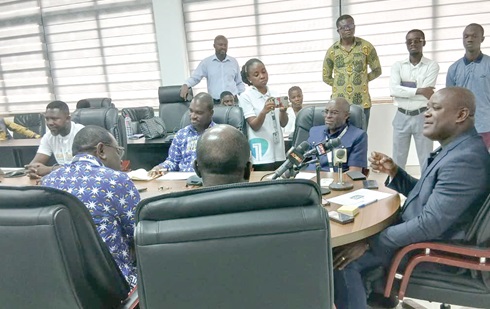The Ghana Tertiary Education Commission (GTEC) will start arresting those who insist on using honorary professorship for prosecution this week.
It said individuals using those titles based on honour awards violated the Education Regulatory Bodies Act, 2020 (Act 1023), stressing that such acts would be treated as public deception and prosecuted accordingly.
“For clarity, the term ‘honorary professor’ is non-existent in Ghana’s tertiary education system. The title Professor is strictly reserved for academic staff who have progressed through the academic ranks.
“Only a university's governing council may confer such a title, either through promotion or direct appointment with appropriate academic qualifications,” the Director-General of GTEC, Prof. Ahmed Jinapor, explained at a press briefing last Friday in Accra.,
He added that any individual claiming the title “honorary professor” was misleading the public and such conduct was fraudulent.
Prof. Jinapor explained that the misuse of academic titles such as doctor, professor or chartered constituted an offence under the law, and penalties for violations included fines up to 250 penalty units, imprisonment for up to a year or both.
“So, our emphasis is a crusade to get the public to come to terms with the fact that the honeymoon period is over,” Prof. Jinapor insisted.
Mandate of GTEC
The press briefing was for GTEC to explain the rationale behind sanitising the tertiary educational space on the use of honorary doctorate and professorship.
It was also to justify GTEC as the institution mandated by law to regulate the tertiary education space, including the use of academic titles.
In accordance with Section 8(4)(d) of the Education Regulatory Bodies Act, 2020 (Act 1023), the GTEC is mandated to regulate the use of higher education nomenclature and titles, including ‘university’, ‘college’, ‘emeritus’, ‘professor’, ‘doctor’, ‘chartered’ and related terms.
Prof. Jinapor added that as stipulated in the 2020 (Act 1023), GTEC underscored that only accredited and chartered institutions might confer honorary degrees and no institution was permitted to award the title “honorary professor.”
“Honorary professor titles conferred by foreign bodies without legitimate academic standing are not recognised in Ghana by the Commission.
“Misuse of academic titles-such as ‘Doctor’, ‘Professor’, ‘University’, ‘Chartered’, etc. constitutes an offence under the law,” Prof. Jinapor explained.
He said the penalties for violations include fines up to 250 penalty units and imprisonment for up to one year or both.
“GTEC reserves the right to investigate and sanction any individual or institution involved in the misuse or misrepresentation of academic titles,” he emphasised.
Earning PhD
Prof. Jinapor, who was supported by top management of the commission, including the Deputy Director-General, Prof. Augustine Ocloo, stressed that for the avoidance of doubt, academic titles such as PhD, MSc, or bachelor’s were earned through rigorous, structured and supervised educational programmes.
“This involves coursework, examinations, original research, thesis defence, and external review. In fact, if you take a PhD in mechanical engineering, it's conferred after years of coursework, research and successful defence of thesis before an academic committee.
“So, you just don't get up one day and confer on yourself the title PhD, or its equivalent, without having gone through the rigour of what academics do,” he insisted.
Honorary doctorate
Prof. Jinapor explained that an honorary doctorate was a symbolic recognition awarded by accredited, chartered institutions, which acknowledged societal contributions, philanthropy or leadership.
He, therefore, said any individual claiming a title of honorary professor was misleading the public, and “such conduct, I must say, is fraudulent”, adding that in line with international best practices, such practices were prohibited.
“In line with international best practices, use of the title ‘Dr’ by honorary doctorate recipients; use of the title ‘Professor (Prof.)’ based on unverified ‘honorary’ awards and the adoption of the title ‘Professor’ through visiting roles, where the home or host institution has not officially conferred the rank through a documented appointment process, are prohibited,” Prof. Jinapor clarified.
The GTEC Director-General insisted that using honorary titles in a manner that mimicked academic designations, “misleads the public and undermines academic credibility”.
He added that an individual who used doctor, based on an honorary award, might be mistaken for a qualified medical doctor, academic, or researcher, creating ethical and legal risk.
Prof. Jinapor made it clear that no institution in Ghana was allowed to issue honorary professorship, stressing that professorship was an earned rank.
Throwing more light on the academic titles elsewhere, such as the United States, he explained that a lecturer entry point was a professor, adding, “In Ghana, you start as a lecturer, move to senior lecturer, as an associate professor, then professor.”
He, therefore, called on the media, civil society, and the general public to support efforts to preserve the integrity of Ghana’s education system.
Writer’s email: severious.dery@graphic.com.gh

